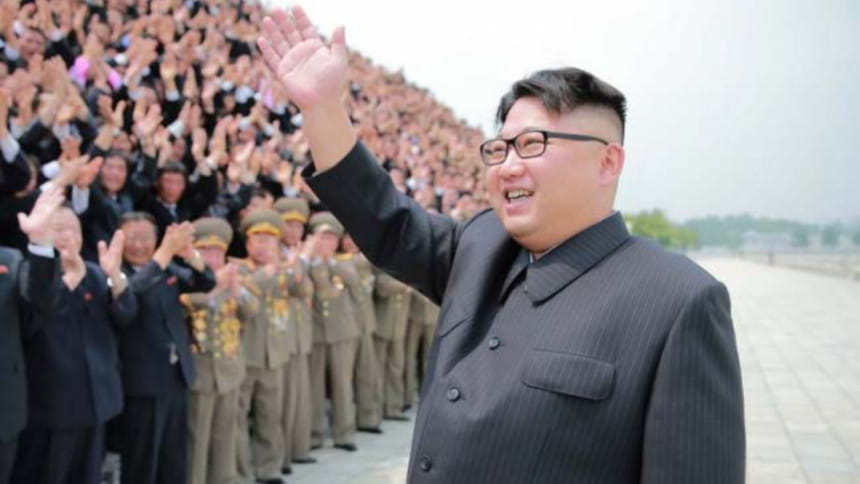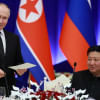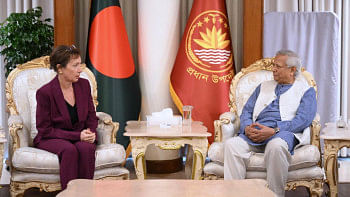Kim Jong-un's methods in his madness

A former British Prime Minister Neville Chamberlain's policy of appeasement to Hitler couldn't stop the Second World War from happening. This infamous reference point is raked up by the free rein the North Korea's predictably unpredictable leader Kim Jong-un has had, according to some analysts. Whether this is a bad or good analogy only time will reveal; and we needn't wait too long to find that out.
The second risk factor in the current scenario emanates from this: At the height of Cold War and nuclear arms race between the US and the former Soviet Union, the fear of mutually assured self-destruction kept them at bay from nuclear misadventure. Even the first use option was considered fraught with lethal dangers for the country entertaining such an idea.
Such an equilibrium is no longer there, so that the US, the most powerful nation in the world, is having to call the North Korean strongman "an existential threat."
Experts believe that North Korea has achieved miniaturised versions of nuclear weapons to fit into an intercontinental ballistic missile (ICBM). It may have attained deliverability of nuclear payload. Currently, they have been launching missiles from a lofty angle (one such having fallen 120 miles off Japan's northernmost island of Hokkaido); but should they launch an ICBM from a flatter trajectory it could go the intercontinental distance.
Of course, the US is capable of protecting South Korea and Japan. One of the retired US generals participating in a Fox TV programme recently however said as for ICBMs that might be directed towards the US, they were 50 percent prepared for such an eventuality. According to the retired general, the US defence system has yet to be perfected. Whether such a view is shared by the top US defence experts begs question.
In the meanwhile, Pyongyang is contemplating to attack the US south Pacific strategic island base Guam.
China and Russia have signed up to the UN sanctions which the American optimists believe will deliver a "gut punch" to Pyongyang. Tillerson, the US secretary of state on the sidelines of the ASEAN summit, offered scaling down of special strategic exercises among the US, South Korea and Japan to draw North Korea to talks.
Pyongyang will have nothing of it, ratcheting up bellicosity instead, vowing "thousand-fold revenge on the US."
Trump's resolve to meet the threat with "fire and fury" though typical of him makes one wonder whether it is a reactive outburst or he is proactively committing the US to war.
For all we know, US planes are flying around North Korea. Japan is shedding its traditional pacific policy to develop and use an offensive capability. Among its options is dismantling the bases from which North Korea launches its missiles. But Pyongyang is known to be able to launch missiles from submarines also.
Trump earlier on had said, "China can stop this nonsense." China has gone as far as supporting the UN's fresh dose of sanctions on Pyongyang despite the latter being critically dependent on imports from Beijing. Yet, an underlying commonality of views exists between them vis-à-vis the US' role in Asia.
Cast aside the political and diplomatic niceties among the major players and try to pinpoint the underlying tendencies and motivations centring on the so-called "new normal".
What does China want? It appears China may have aimed at either US pullout from Asia or curtailment of its activities in the continental Asia. Hawks in the Chinese Communist Party reportedly say, "You cannot have two kings in one kingdom."
China's One Belt, One Road infrastructural super connectivity project is dovetailed to that idea.
That's why some strategic thinkers take the view that the current India-China relationship has seen a collateral spike in conflicts in parts of South Asia.
Some Chinese academics and historians are inclined to lay a historical claim to Japan and two Koreas as their natural spheres of influence.
The benefits of détente and breakup of Iron Curtain created a balance of power that helped holding the world order together. But the misadventures in the Middle East, divisiveness in Europe and the advent of Trump presidency have rocked the applecart of equilibrium.
For Bangladesh's part, she can and should stay clear of big power rivalries and play a conscientious role in world affairs.
Shah Husain Imam is a commentator on current affairs and former Associate Editor, The Daily Star. E-mail: [email protected]










Comments